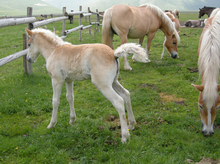Cases of a fatal horse disease continue to rise in Saskatchewan, but the worst of a recent outbreak may be over according to the federal agency that monitors the disease.

Equine Infectious Anemia in Canada
The worst of a recent outbreak of EIA may be over according to the Canadian federal agency that monitors the disease.
The outbreak of Infectious Anemia (EIA) began in January and over the last three months positive cases have turned up on 20 farms in six different rural municipalities – mainly around Prince Albert.
Five locations and 10 positive cases were reported in January. That spiked to 12 and 48 cases in February. Last month the numbers dropped to three locations and three cases.
Alex McIsaac, a disease and control specialist with the Canadian Food Inspection Agency (CFIA) said it’s a trend he thinks will continue for the short term.
“Usually once you get through the contact animals it should cease. And then you’d be looking at it starting up again when the insect vector comes and starts spreading the disease around again.”
Post spring is when more cases could begin showing up, said McIsaac with the hatching of biting insects, such as deer and horse flies that are mainly responsible for the spread of the disease from horse-to-horse.
The CFIA has said the main reason for more cases this year has been increased testing, especially at shows and race events, where it’s become mandatory, said McIsaac.
“So when you do that your increasing the surveillance which means you’re looking for the disease more which means you’ll probably find the disease more.”
While there is no cure or vaccine to prevent the disease, McIsaac said it’s important that horse owners have their animals tested so to not put other animals at risk.
“An apparent carriers don’t really show any outward signs that they have the disease and the only way you would know a (horse) is positive is by doing a blood test.”
